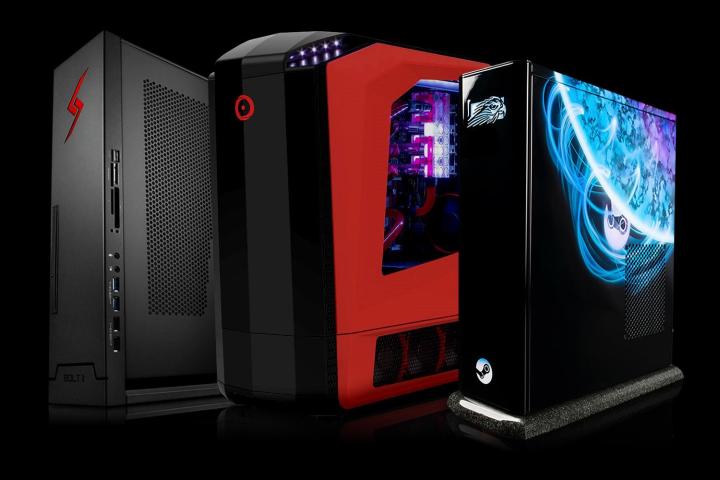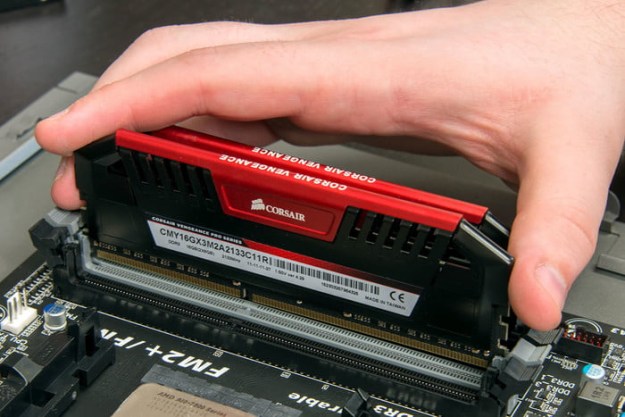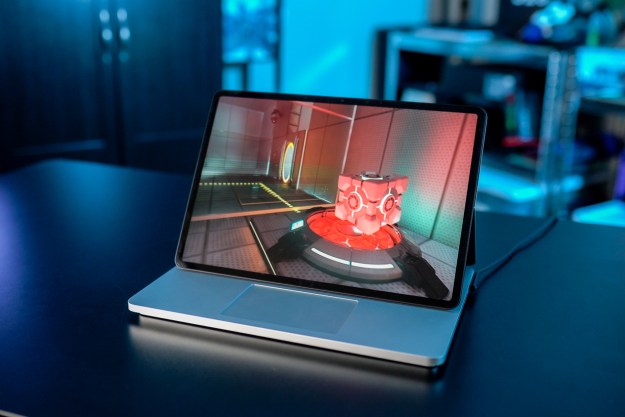
The last few years have brought no shortage of bad news for the PC market. Global sales have plunged into a nosedive that began in 2011, and the market has returned to sales figures last seen in late 2009. The ultrabook, Intel’s attempt to increase the average price of new PC laptops, remains a niche. What’s more, Windows 8’s marketshare is anemic.
In short, manufacturers are fighting over a shrinking pie. Those on the losing side of the battle, like Acer, have taken tremendous losses, and even victors like Lenovo have won only modest growth. But what about smaller players like Origin, Falcon Northwest and Digital Storm? Are they now struggling to grab scraps from a crowded table, or have they left for seats at a different restaurant?
Good news from small companies
Our visit to Origin at this year’s CES was a bright spot at a show where most companies hid their PCs away at small, discrete booths lost among a sea of tablets. Origin announced a new, proprietary, modular case design unlike anything available from the competition, and was eager to share with us an optimistic vision of the company’s future. CEO Kevin Wasielewski told us his company “has been growing every year, at a great rate, and the enthusiast base is actually growing.”
And Origin is no aberration. Kelt Reeves, CEO of Falcon Northwest, sees no evidence of the general downturn hurting his sales. “The press says 2013 was a horrible year for PC sales,” he told us “but from the year we’ve had, I’ve got to assume they meant it was a horrible year for low-end PC sales.”

Harjit Chana, CEO of Digital Storm, echoed his competitors, saying the strength of small companies is due in no small part to their premium appeal. “You don’t need to buy a $400-$500 computer to surf the web, when you can get a tablet to do that,” he points out – but boutique makers don’t compete in that market. Consumers may be choosing an iPad over a new laptop, but no one is choosing between an iPad and a desktop with four GTX Titans.
It’s not all headshots and multi-kills
Gamers, the traditional market for high-end PCs, deserve some credit for keeping small PC makers healthy. They are loyal customers, and while mobile gaming has grown, its uptick hasn’t drawn hardcore gamers away from their pricey and powerful rigs. Boutiques aren’t just about playing games though; they also sell to a growing base of professionals, businesses and even government agencies, all of which demand customized, high-performance computers.
Businesses make great customers because, like hardcore gamers, they’re unlikely to turn elsewhere no matter how popular other devices become.
Harjit Chana told us that Digital Storm also sells significant volume to businesses, and is GSA (General Services Administration) certified, which means government contractors are approved to purchase computers from Digital Storm for a variety of purposes. Kelt Reeves, meanwhile, told us that Falcon Northwest’s sales to enterprise customers have been rising for at least a decade.
Businesses make great customers because, like hardcore gamers, they’re unlikely to turn elsewhere no matter how popular convertibles, tablets and other devices become. And while large competitors like HP, Dell and Lenovo do sell to the enterprise market, their inability to accommodate niche needs has forced organizations that want serious performance to seek out the personal touch that small companies like Origin, Falcon Northwest and Digital Storm can provide.
Challenges remain
There are concerns that keep these CEOs up at night, however, and the most troublesome is the health of PC ecosystem. High-performance PC makers rely on high-performance parts, and can only be at their best when their partners are also healthy. Harjit Chana highlighted this point, telling us “my concern is that a dwindling mainstream could hamper our business, since companies like Intel and Nvidia may not be able to push new advances.” Unfortunately, Intel’s recent announcement that it will lay off 5,000 employees is an indication that this worry is not without merit.

Microsoft has also caused some headaches. Both Origin and Digital Storm told us that Windows 7 remains very popular with their customers, particularly in the enterprise market, while Windows 8 is seen as an unnecessary complication. Though sales have improved with the release of Windows 8.1, a cloud of skepticism hangs over Windows, and it’s unclear if any company, Microsoft included, is still interested in developing an OS that specifically targets the needs of high-end computers.
Hope for the future
Still, these challenges aren’t insurmountable, and all three CEOs we spoke to are convinced that healthy sales of high-end computers indicate that the PC is here to stay. Kelt Reeves, CEO of Falcon Northwest, scoffed when asked about the PC’s demise, saying “When the PC sales number drops out of the hundreds of millions to some number equivalent to typewriter sales, then I’ll agree we’re in a post-PC era.” Origin’s Kevin Wasielewski, meanwhile, told us “there’s always demand from people who need the high-end.”
“Our clients are enthusiasts. Their PC is not just about getting a job done.”
And that’s not the only technology that will keep PCs relevant. Kevin Wasielewski believes virtual reality holds promise because it’s “a night and day experience” compared to a conventional monitor and, to provide the best experience, requires photo-realistic rendering at high resolution. Kelt Reeves, meanwhile, sees promise in a wide variety of new technologies, including G-Sync and Nvidia’s upcoming Maxwell GPUs. “There’s always something newer and more exciting over the horizon,” he told us, adding “Our clients are enthusiasts. Their PC is not just about getting a job done.”
Almost forty years have passed since Microsoft was founded with the vision of putting a PC in every home. That goal seemed like science fiction at the time; today, it’s so last millennium. The average consumer’s attention has moved on, caught by smartphones, tablets and consoles.
But PC geeks aren’t headed for extinction. They’re here to stay and, apparently, are spending more than ever before.


